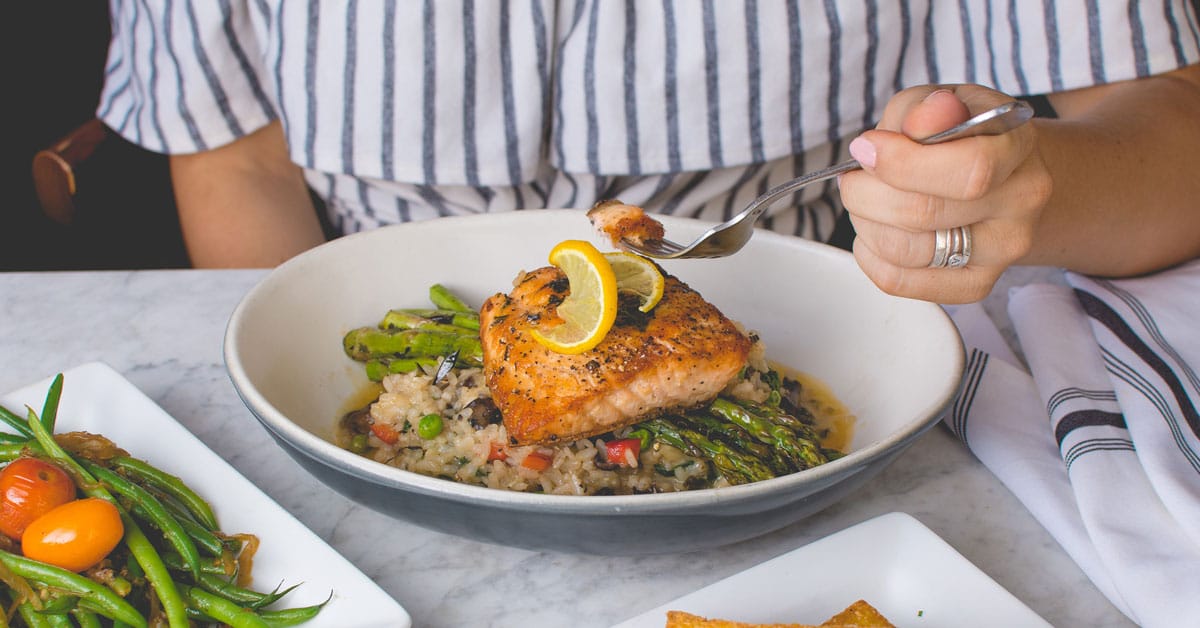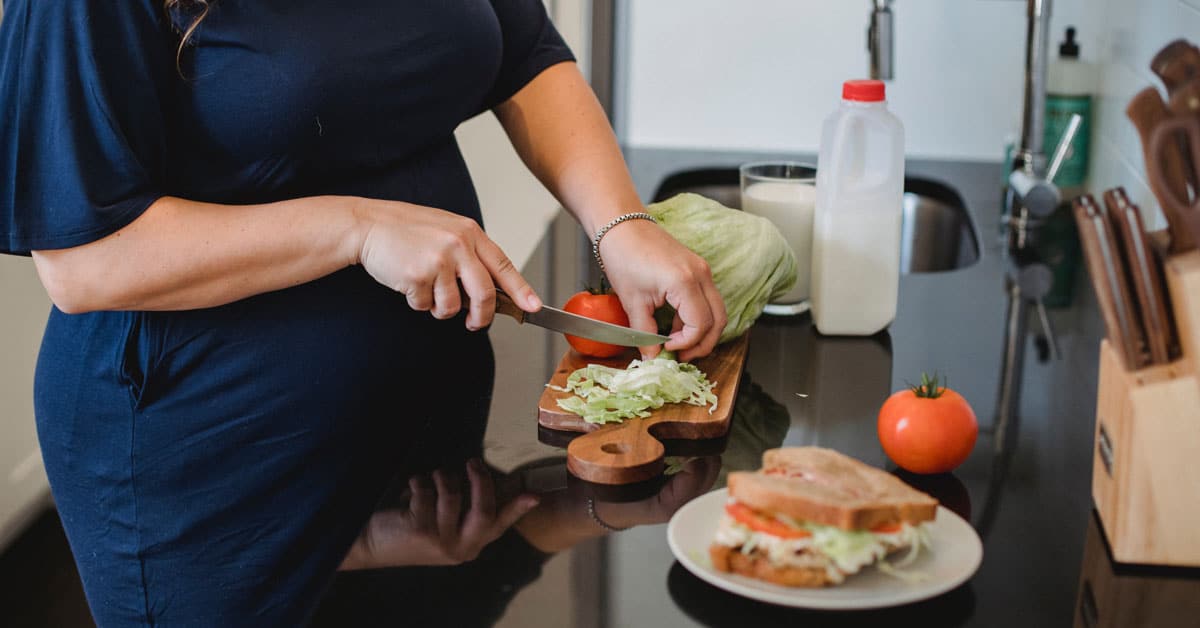Are you planning a pregnancy? Maybe you have recently found out that you are expecting. Congratulations! You are likely here because you know that a healthy prenatal diet and what you eat while pregnant will play an important role in a healthy pregnancy. Eating a mostly nutritious, balanced, and adequate prenatal diet is one of the most important ways to take care of yourself and your growing baby. Nutrition influences the development of all body systems, as well as physiological processes like metabolism. Making healthy food choices can ensure that your prenatal diet provides the key nutrients that are needed for nourishment before and throughout pregnancy.
Searching the web for nutrition information is overwhelming and confusing. There are lots of articles out there that will tell you that a prenatal diet involves eating healthy. We are going to take the guesswork out of the general advice to “eat healthy” and get specific on what that means for the prenatal diet. Whole Lifecycle Nutrition is here to support you during this exciting (and sometimes daunting) pregnancy journey.

Planning a Pregnancy? A Healthy Diet and Supplements Before Pregnancy
Before you become pregnant, your diet and lifestyle are important factors in laying the foundation for a healthy pregnancy. Prenatal nutrition is not just crucial while pregnant, but before becoming pregnant too.
Before pregnancy, a diet rich in vitamins and minerals will build up the nutrient stores that will be essential for a future baby’s development. Following a healthy diet and lifestyle before becoming pregnant doesn’t only help baby, but will benefit you too. Even if you are following a nutritious diet, a prenatal vitamin is recommended for any woman of childbearing age who could become pregnant. The American College of Obstetricians and Gynecologists (ACOG) recommends taking a daily prenatal vitamin that contains iron and at least 400 micrograms of folic acid starting at least one month before pregnancy to reduce the risk of birth defects. Consult your practitioner if you have questions about the appropriate supplement for you.
In addition to taking a prenatal vitamin, let’s dig into what nutrients you should optimize as part of a prenatal diet.
Key Nutrients in the Prenatal Diet: Protein
While your entire eating pattern is relevant before and during pregnancy, there are a few key nutrients to focus on.
As your baby grows, protein needs increase. Protein acts as a building block for muscle, skin, blood, and other cells. To meet protein needs in the prenatal period, eat a variety of protein sources such as fish, meat, poultry, eggs, dairy products, beans, lentils, tofu, edamame, nuts, and seeds. Some fish, nuts and seeds do double duty as rich sources of omega-3 fatty acids (discussed below), another important pregnancy nutrient.
If you follow a vegetarian or vegan eating style, a more carefully planned diet is an important step in maximizing pregnancy nutrition. Most plant sources of protein do not supply all of our essential amino acids. Amino acids are the building blocks of protein in our body. Essential amino acids are those that the body cannot synthesize on its own. It is possible to meet your and baby’s overall nutrition and protein needs before and during pregnancy while following a vegan diet. Contact us if you would like to speak to a registered dietitian with expertise in vegan diets to evaluate your current eating pattern and nutrient intake. We can collaborate with you in creating a custom plan that fits your preferences.
Key Nutrients in the Prenatal Diet: Omega-3 Fatty Acids
Early in pregnancy, your baby’s developing brain requires omega-3 fatty acids, commonly referred to as “omega-3s.” Omega-3s are fats that are essential to get from the diet because your body can’t make them. During pregnancy, consuming adequate omega-3s is associated with reduced maternal depression, a decrease in the incidence of preterm birth, reduced allergies and asthma in children, and improved neurocognitive outcomes in children.
There are three main types of omega-3s. Alpha-linoleic acid (ALA) is primarily found in nuts, seeds, and oils. Some food sources of ALA are walnuts, chia seeds, flaxseeds, flaxseed oil, hemp seeds, canola (rapeseed) oil, soybeans, and soybean oil. ALA can be converted in the human body to the other main omega-3s, but the conversion is ineffective.
Docosahexaenoic acid (DHA) and eicosapentaenoic acid (EPA) are found mainly in oily fish like salmon, tuna, and sardines. These essential fatty acids are important in cell structure, fetal development, eye health, and for their antiinflammatory properties, to name a few of their health benefits. Although primarily consumed in fish and fish oil, as well as some other animal foods, DHA and EPA are also found in marine algae. Most people do not consume the recommended amount of DHA and EPA containing foods. Global mapping indicates that there tends to be low levels of omega-3s in the bloodstream of adults in the North American population.
DHA and EPA are more important than ALA during the prenatal period. If you do not eat fish, discuss an omega-3 supplement with your practitioner. It is recommended that people following a vegan or vegetarian diet obtain DHA and EPA with algal oil supplements.

Key Nutrients in the Prenatal Diet: Micronutrients
Protein and omega-3 fatty acids aren’t the only essential nutrients during pregnancy. Deficiencies of folate, iron, calcium, and vitamin D in a mother can affect fetal development and have long-term health consequences for both mother and baby.
Folate
It is amazing to think of a human growing from scratch in those nine months from conception to birth. Folate is a key player in cell division, which occurs at a rapid pace during pregnancy. When it comes to a baby’s developing brain, folate is right up there with omega-3s. Folate is one of the B-vitamins. It is important to get enough B-vitamins from food every day since excesses are removed from the body in our urine, and during pregnancy we are using up nutrients at a faster pace. Folic acid is the synthetic form of folate found in supplements and fortified foods. Grains and cereals are fortified with folic acid to prevent neural tube birth defects. The body can absorb folic acid better than folate found in whole foods.
The recommended dietary allowance (RDA) for folate in women of childbearing age is 400 micrograms per day, and this increases to 600 micrograms per day during pregnancy. Some studies recommend getting 400 micrograms of folic acid in a prenatal supplement and eating foods rich in folate like leafy greens, peas, beans, and lentils.
Iron
Iron is a mineral that makes up hemoglobin, which transports oxygen to body cells.
Iron status in the body is critical for both mothers and babies. Without proper iron stores before pregnancy, it is unlikely that the mother and baby will meet iron needs during pregnancy. Unfortunately, iron deficiency is a widespread global problem, affecting close to 20% of pregnant women in developed countries and even more in developing countries.
Iron deficiency during pregnancy can have significant negative health consequences. For mothers, iron deficiency during pregnancy is associated with decreased immune function and a future increased risk of heart disease. For babies, iron deficiency is associated with an increased risk for preterm birth, low birth weight, and abnormal development and cognitive function.
In the prenatal period, the RDA for iron increases by 50% from 18 mg to 27 mg per day. Choose a variety of foods with iron such as fish, meat, dark leafy greens, beans, lentils, and fortified foods. Iron in animal foods (heme iron) is more easily absorbed than iron in plant foods (nonheme iron); to improve iron absorption in plant foods, add sources of vitamin C like citrus, peppers, broccoli, and cauliflower. Eating plant foods with animal foods also enhances absorption of nonheme iron.
Ask your practitioner about testing your iron status and evaluating the need for supplemental iron.
Calcium and Vitamin D
Calcium is an important mineral in the prenatal diet because it supports bone, teeth, heart, nervous system, and muscle development. Mothers not consuming enough calcium during pregnancy are at higher risk for high blood pressure problems and osteopenia, a weakening of the bones, as well as muscle conditions. Their babies may be at a higher risk for delayed growth, low birthweight, and poor bone mineralization.
For pregnant women, the RDA for calcium is between 1,000 and 1,300 mg per day depending on age. Getting enough calcium is especially important during the third trimester when bone mineralization occurs at the most rapid pace. Many foods are rich in calcium. Milk, eggs, and cheese are the primary food source of calcium in the United States, with over 70% of calcium intake from dairy alone. Canned fish with bones, white and pinto beans, plant based milks and orange juice fortified with calcium, leafy green vegetables, nuts, tofu, and chia seeds are other good food sources of calcium. Increased calcium needs can usually be met by diet alone, though supplementation may be recommended for some.
The body needs vitamin D to absorb calcium. For women of childbearing age and pregnant women, the RDA for vitamin D is 15 micrograms (600 IU) per day. Fatty fish such as salmon and fortified dairy products are the best sources of vitamin D. Our bodies can also convert sunlight to vitamin D, but darker skin and sunscreen reduce this pathway. Also, many geographic areas do not have strong enough UV rays for much of the year to activate this conversion. It can be difficult to reach the vitamin D RDA through sunlight and food alone. Talk to your practitioner about whether a vitamin D supplement is right for you.

Foods to Limit or Avoid in the Prenatal Diet
You may have heard that certain foods are off limits during pregnancy. Alas, ‘tis true. In general, it is a good idea to avoid any foods that are more likely to cause a food borne illness. Foods that are under cooked (so long, sushi; bye bye rare steak), unpasteurized, or are likely to harbor unsafe bacteria or toxins should be avoided if possible.
Fish High in Mercury
Fish is a great source of protein and many species of fish have omega-3s that are essential for fetal development. Some large species of fish are high in mercury, a harmful toxin found in high levels in swordfish, tilefish, bigeye tuna, king mackerel, and shark. There are plenty of other options to choose from. Fish lower in mercury include salmon, sardines, canned light tuna, shrimp, cod, and haddock. Choose two to three servings of fish each week to get the recommended dose of omega-3s.
Foods Linked to Listeriosis
Listeria is a bacterium found in soil, water, and some animals. Listeriosis is a food borne infection that can be harmful to a growing baby. To prevent listeriosis, avoid eating unpasteurized milk and cheese, pate and meat spreads, and smoked seafood. Cook hot dogs and deli meats to steaming hot just before serving. Wash fruits and vegetables before eating in addition to other food safety practices.
Ultra Processed Foods and Other Considerations
The good old nutrition standards we all know and love are the same for women who are pregnant, or men and women who wish to conceive. A prenatal diet should be centered on nutrient-dense foods including vegetables, fruit, lean proteins, whole grains, nuts, legumes, seeds, and low-fat or nonfat dairy products. Other foods and drinks high in refined carbohydrates and saturated fat like candy, soda, energy drinks, snack foods, butter, red meat, and full-fat dairy products should be limited for optimal health and fertility.
What about caffeine? Tea and coffee can be part of a prenatal diet. It is recommended to consume under 200 milligrams of caffeine per day during pregnancy. Excess caffeine has been associated with reduced fertility and poor birth outcomes. Cutting the caffeine may be easier said than done for someone in full blown baby growing mode and is more tired than they thought imaginable. It might be a good idea to consider reducing the caffeine before becoming pregnant to ease into the transition and potentially help with fertility.

Prenatal Weight
Practicing healthy lifestyle habits prior to pregnancy will help achieve the recommended weight gain. Your doctor will advise on a pregnancy weight gain goal, as determined by your pre-pregnancy Body Mass Index (BMI). Excess weight gain is a predictor of pregnancy complications and a child’s future health risks, including risk of obesity.
Early in pregnancy, your body does not need extra calories. Energy requirements only increase once the second trimester begins. Usually this can be accomplished by adding in one or two nutrient dense snacks. An apple with some almonds, cottage cheese and whole grain crackers, hummus with carrots, or toast with peanut butter are some examples of snacks that provide energy and nutrition. Try to choose nutrient-dense foods rich in key nutrients over foods like pastries, chips, and icecream. It is helpful to think of food as nourishment for your body and the baby. Every bite is an opportunity.
Final Thoughts on Nutrition and a Prenatal Diet
When trying to conceive, or when you become pregnant, nutrition and lifestyle are one of the few things that you can control. Even so, when the cravings hit or exhaustion takes over, the last thing most moms-to-be want to do is eat a bag of carrots. It can be difficult to carve out an eating plan that fits your food preferences, is satisfying, simple, and accomplishes all of the nutrition goals that have been reviewed. With some effort, a balanced prenatal diet can suit all cuisines, preferences, and budgets. Take it one meal at a time. Remember that food is an opportunity to nourish yourself or your growing baby. And, if you are still looking for some customized guidance and support, contact us for personalized fertility nutrition counseling or pregnancy nutrition counseling.
Medical Disclaimer:
The information provided on this blog is for educational and informational purposes only and is not intended as a substitute for medical advice, diagnosis, or treatment. Always consult with a qualified healthcare provider, such as your physician, pediatrician, or a registered dietitian, before making any changes to your or your child’s diet, health routine, or treatment plan.
While we are a medical practice specializing in integrative and functional nutrition, the content shared here reflects general knowledge and holistic guidance, and may not be appropriate for every individual. Reliance on any information provided on this site is solely at your own risk.


